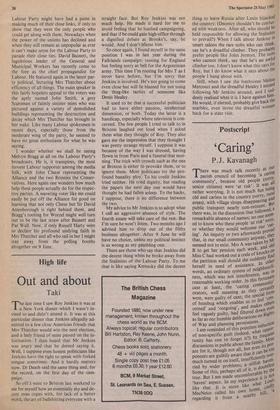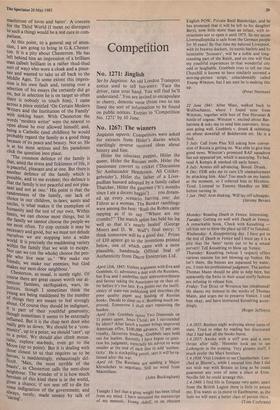Postscript
`Caring'
P.J. Kavanagh There was much talk recently at our parish council of becoming 'a caring community', because old people (sorry senior citizens) were 'at risk'. It was a" rather worrying. It is not much fun being, old and carless in the country (sorry, rural areas), with village shops disappearing and public transport nearly non-existent. Bit' there was, in the discussion that followed, a remarkable absence of names; no one scent- ed to know who these people 'at risk' were' or whether they would welcome our 'ear- ing'. An inquiry or two afterwards proved that, in our small community anyway, they seemed not to exist. Mrs A was taken by Mr B to get her pension each week, and 01° Miss C had worked out a code of knocks on the partition wall should she suddenly find herself in need of assistance. In other herself an ordinary system of neighbour!i"in ness, which was not interference, was reasonable working order. In this fortunate case at least, the 'caring communit):' orators, well meaning as they certaintY were, were guilty of cant; the special fOrnt of humbug which enables us to feel 'On: cerned' and 'outgoing', and makes others feel vaguely guilty, had filtered down eyets as far as our humble deliberations on Rig of Way and planning permissions. I am reminded of this pointless induetifra, of non-specific guilt (indeed, what °1311u.-• tunity has one to forget it?) by frequent's; discussions in public about the familY.its 11r M 0.. are for it, though not all, but even ,,c, ponents are guiltily aware that it can bey much turned in on itself, insufficiently we°Iii. vied by wider problems; a selfish h Some . B e ouft am m t is perhaps randae m p su all oof fiot ,r ti as bdl e o u u bba vyt not `haven' e tnh' aaspect.t. l t sI In more eexperience li k e wh a it t Lou oniuliys MacNeice called his own home, e°°, hill a
regarding it from a nearby - maelstrom of loves and hates'. A concern for the Third World (I mean no disrespect to such a thing) would be a rest cure in com- parison.
At this point, to a general sag of atten- tion, I am going to bring in G.K.Chester- ton. It is a pity about Chesterton. He has left behind him an impression of a brilliant Man (albeit brilliant in a rather thud-thud sort of way) who wore a cloak and a pince- nez and wanted to take us all back to the Middle Ages. To some extent this impres- sion is his own fault and, turning over a selection of his essays (he certainly did go on, but in selection he is on target so often there is nobody to touch him), I came across a piece entitled 'On Certain Modern Writers and the Institution of the Family' with sinking heart. With Chesterton the words 'modern writer' were the nearest to open abuse he ever allowed himself; and, being a Catholic (and childless) he would probably regard the family as a good thing because of its peace and beauty. Not so. He is at his most serious and his paradoxes click the question into place.
The common defence of the family is that, amid the stress and fickleness of life, it is Peaceful, pleasant and at one. But there is another defence of the family which is Possible, and to me evident; this defence is that the family is not peaceful and not plea- sant and not at one.' His point is that the randomness of the family, our lack of choice in our children, in-laws, aunts and uncles, is what makes it the exemplum of humanity and the test of our own. Within limits, we can choose most things, but in the family we cannot choose the people we see most often. To step outside it may be necessary and good, but we must not delude ourselves we are stepping into a wider world. It is precisely the maddening variety within the family that we wish to escape. Nor can we (on the whole) choose the peo- ple who live near us.' We make our friends; we make our enemies; but God makes our next-door neighbour.' Chesterton, as usual, is surely right. Of course there are great causes worth our at- tention: famines, earthquakes, wars, in- justices. though I sometimes think the Young are being maddened by the number of things they are meant to feel strongly about. Of course they should be indignant, it is part of their youthful generosity, though sometimes it seems to be externally inflamed. But it is the chap next door who really gets us down. We should be a 'corn- !tunny', up to a point; we should 'care', up to a point. We should also climb moun- tains, explore sea-beds, even go to the Moon (up to point). But it is dealing with those closest to us that requires us to be heroes, is maddeningly, exhaustingly dif- ficult. 'Man, the most terrible of the beasts', as Chesterton calls the next-door neighbour. The wonder of it is how much heroism of this kind there is in the world, given a chance, if not sent off to die for some indignation of the government; and always, surely, made uneasy by talk of
caring'.















































 Previous page
Previous page